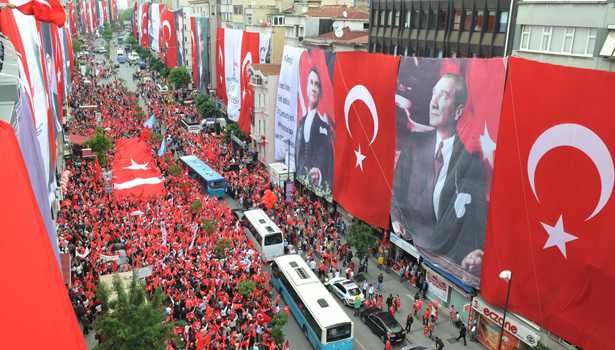The Turkish election results are in with few surprises but with major questions as to Turkey’s political directions. The Justice and Development Party (AKP), with its conservative-Muslim roots, claims the most victory, taking over half of the votes and improving three straight elections in a row, though it will lose seats in the new parliament. The Republican People’s Party (CHP), with its secular, Kemalist legacy, improved on its last showing, but gained only a quarter of the vote. The ultranationalist National Movement Party (MHP) survived last-minute scandals to enter parliament with 13% of the vote. Even the Kurdish party managed to take seats in parliament with its independent candidates garnering 6% of the votes. What do the results betoken for the self-proclaimed model democracy in the Middle East? With these election results Turkey now faces a political crossroads. The new government of the AKP can either take Turkey down the road to constitutional reform in a more liberal democratic direction or revert to some of its campaign rhetoric that promoted illiberal tendencies that will only increase Turkey’s societal divisions and repress fundamental political freedoms.
During the election, the rhetoric of all parties was shockingly partisan, but the AKP was the most divisive. AKP leaders attacked Turkey’s principal religious minority, the Alevis, as well as its principal ethnic minority, the Kurds. The AKP rhetoric was often unabashedly anti-Semitic. Although pitched for domestic consumption, the rhetoric has also been heard by Turkey’s neighbors in the Middle East and its friends around the globe — all of whom are wondering how this illiberal rhetoric will translate into not only domestic policies but also Turkey’s foreign policies in the Middle East and relations with the West.
Turkey has prided itself on using its soft-power to build good relations with its neighbors. Based on that decision it developed strong economic ties with Syria, Iraq and Iran doubling its trade in less than a decade. It spoke of important historical and cultural connections. With that came cooperation on the issue of Kurdish separatism and terrorism plaguing Turkey, Syria and Iran and dependent on cooperation with Iraq whose mountains serve as the base for many of the Kurdish separatist fighters. During the 1990s Turkey lost approximately 30,000 citizens in a tragic civil war in its southeast. Though it ended with the capture of Abdullah Ocalan, the leader of the Turkish Kurdish separatist leader in 1998 Turkey still loses countless citizens senselessly each year to terrorist acts.
The Kurdish issue in Turkey requires more than military and intelligence cooperation with its neighbors. It requires a strong domestic policy of improving the economy in the Southeast, which is home to a large number of Kurds, recognizing their cultural demands such as allowing Kurdish courses in the public schools and recognizing that Turkey is a multi-ethnic nation. Therefore the Prime Minister must find a way to reverse the extremely harsh language he leveled in this campaign towards the Kurdish population of Turkey going so far as to call the main Kurdish party “terrorists.” Now as he and the AKP seek to create a coalition for constitutional reform including this Kurdish voice will be critical.
Internationally Turkey is facing a Middle East increasingly threatened by a Sunni-Shia divide. Therefore playing on sectarian differences is a dangerous double-edged sword. The fact that the main opposition candidate Kemal Kilicdaroglu is an Alevi and that the Alevi community of Turkey forms approximately 20% of Turkey should be a source of pride, not derision. Unfortunately throughout the campaign when speaking in strongly Sunni areas Prime Minister Erdogan made sure to mention the opposition leader’s Alevi roots thereby galvanizing audiences into jeering anti-Alevi slogans and creating a spirit of divisiveness that does not augur well for an inclusive and multi-confessional democracy. This behavior is directly at odds with the care the Prime Minister took to visit Shiite Mosques and leaders on his recent visit to Iraq. Bridging this divide at home will be critical for Turkey as it tries to stay above the fray of regional sectarian politics and set a successful example for the region.
The new AKP government must rise above its campaign rhetoric if it is to live up to the mandate it has won in the latest election to write a new social contract. For Turkey’s pluralist political community, the contract should be based on liberal democratic principles, if Turkey wishes to maintain its influence as a model democracy in the region and aspire for global status.
Dr. Lenore G. Martin is the Louise Doherty Wyant Professor at Emmanuel College and Associate of the Weatherhead Center for International Affairs and the Center for Middle Eastern Studies both at Harvard University. She is currently in Turkey.
Dr. Joshua W. Walker is a postdoctoral fellow at the Crown Center for Middle East Studies at Brandeis University and a research fellow at the Belfer Center at the Harvard Kennedy School.
via Joshua W. Walker: Turkey’s New AKP Government: Will It Move Towards a Liberal or Illiberal Democracy?.


Leave a Reply